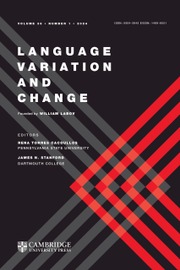Article contents
Constraints on ellipsis alternation: A view from the history of English
Published online by Cambridge University Press: 08 June 2015
Abstract
I offer a diachronic perspective on English ellipsis alternation, or the alternation between inclusion and omission of prepositions from remnants under sluicing and bare argument ellipsis. The relative freedom to omit prepositions from remnants has not been stable in English; this freedom is connected to the strength of semantic dependencies between prepositions and verbs. Remnants without prepositions are first attested, but remain less frequent than remnants with prepositions, as late as Early Modern English and gain in frequency following this period. I demonstrate that three constraints—correlate informativity, structural persistence, and construction type—predict ellipsis alternation in Early and Late Modern English. However, predicting ellipsis alternation in present-day English requires semantic dependencies in addition to the three constraints. The constraints can be subsumed under principles of language processing and production (considerations of accessibility, a tendency to reuse structure, and a conventionalized performance preference for efficiently accessing constituents that form processing domains), permitting a unified processing account of ellipsis alternation with cross-linguistic coverage.
- Type
- Research Article
- Information
- Copyright
- Copyright © Cambridge University Press 2015
References
REFERENCES
- 11
- Cited by


